Brian May: ‘Nothing could ever top playing on the roof of Buckingham Palace with no safety net’
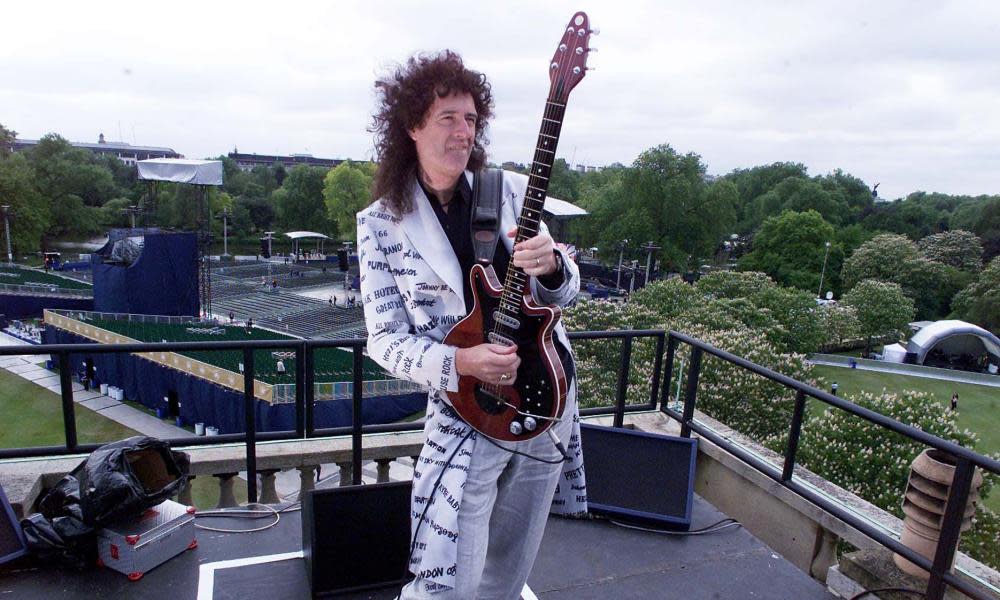
Which guitarists influenced you the most as a young player? Waydgroods
The Shadows Hank Marvin was an inspiration for all of us kids. He had an amazing, melodic, fluid sound. At the more rock’n’roll end, there is James Burton, one of the originators of rock guitar playing, who played for Elvis and Ricky Nelson. I was lucky enough to play with him recently. He’s a real inspiration. It’s not just the sound – it’s the fact that he can bend strings, and make the guitar speak.
If Queen didn’t exist, which band (from any era) would you most want to have been in? Mr_202
The Beatles, probably. I’m sure it wouldn’t have been easy to be a Beatle, but that incredible level of creativity, I would relate to. I watched a lot of Get Back. I got a bit sad watching the first one, because it reminded me of us – sometimes Queen in the studio would be [inhales nervously], “Here we are, and things aren’t quite fitting”. I felt they were in quite a painful place – but the second one, I felt like they were really finding each other again. It’s a textbook of how to be in a studio. If it wasn’t the Beatles, it could’ve been Led Zeppelin. If they let me in.
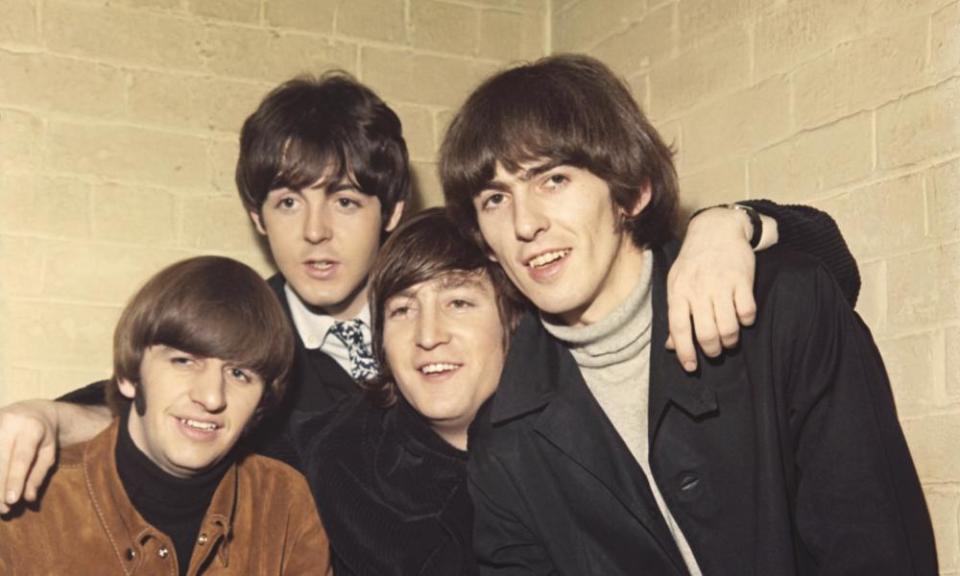
Professionally, what is your biggest regret as far as not recording with another artist (not necessarily another guitarist)? MarceloNeves
I very seldom turn down a collaboration. A regret is that I didn’t get the chance to work with John Lennon. The Beatles didn’t always agree, they were always pulling and pushing – a bit like us and Queen – and I think John would be such a stronger pusher and puller. You’d have to work really hard to keep up, to believe in your instincts. I could imagine us hitting it off.
What was your inspiration to create Star Fleet Project [reissued this month], together with other incredible musicians like Eddie Van Halen? LucyOR98
There were two. One was the song, which was a theme tune for a children’s TV series called Star Fleet. It was a science fiction Japanese adventure story, done with robots. I used to get up on Saturday mornings to watch it with my little boy, who was four or five at the time. The other inspiration was: I’m in LA, and I’m sort of separated from Queen because we needed some space. I just got up one morning and thought: “I could phone anyone – I could go and play”. I don’t think it would have happened in London. I feel more free in Los Angeles, strangely enough – it kind of opens up my social nerve.
I called my neighbour Alan Gratzer, the drummer from REO Speedwagon, and asked him if he thought the idea would work. Then I called Ed Van Halen, a friend who I didn’t see that much of and an extraordinary musician, and he went: “Tell me where and when, I’ll be there.” Then I phoned up all the other guys: Phil Chen, then of Rod Stewart’s band, and Fred Mandel. Everybody said yes. It was amazing.
Do you still use a sixpence piece as a plectrum, or have you decimalised? Nrdawes
Related: Queen’s 50 UK singles – ranked!
Pretty much always – sixpence, or the fingers. I used to play with those little plastic picks but I always found that they were too bendy. I couldn’t really feel what was happening as the thing touched the strings. I went into harder and harder picks, until they were too stiff. Then one day I picked up a coin, which happened to be a sixpence, and I thought, “That’s all I need”. Sixpences are very soft metal, which doesn’t hurt the guitar strings, but if I turn that serrated edge at an angle to the string, I can get that kind of articulating, percussive consonant sound – I call it graunch. Before about 1950, they had a high content of nickel, which makes them really soft, so I especially like a 1947 sixpence – the year that I was born.
Did you have any inkling that John Deacon would leave the band and take no further part after Freddie’s death, and why do you think he walked away? Timsporan
All I can say is that, historically, John was quite sensitive to stress. We all found it hard, losing Freddie, but I think John particularly struggled. We did do a couple of things together, in 1996: the recording of No One But You – the song I wrote about Freddie when we were putting up the statue to commemorate him in Montreux [Switzerland] – and one show in Paris. It was to open the ballet season with an amazing new work by Maurice Béjart, about Mozart and Queen. We played with John on bass, and Elton John sang with us. At that moment, John just looked at us and said, “I can’t do this any more”. We knew that he at least needed a break, but as it turned out he never came back. I don’t think that I can go into much more detail – we have to respect the fact that John needs his privacy now – but he’s still part of the machinery of the band. If we have any major decision, business wise, it’s always run past John. It doesn’t mean he talks to us – generally he doesn’t – but he will communicate in some way. He’s still very much part of Queen.
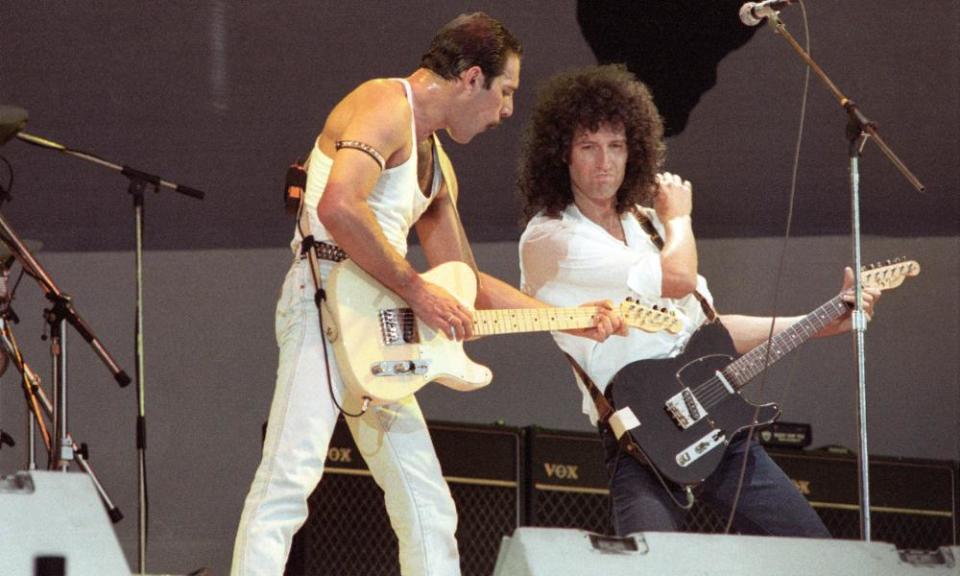
As you walked offstage after your Live Aid set in 1985, did you have any inkling that you’d just stolen the show? Liblabflab
Heh! No. Absolutely no inkling whatsoever. You walk off things like that with a great feeling of exhilaration, but you’re also doing the postmortem: “Oh, God, I didn’t do that, I wish I’d done that, that went wrong”. It did feel different because it wasn’t a Queen audience – all of those tickets for Live Aid were sold before we were announced on the bill – yet they’d still reacted that way. The enormity of that did hit me: the Radio Ga Ga, clap, clap. To see that happening sent big chills up my spine.
Was the call-and-response vocal which Freddie did with the audience at Live Aid pre-planned or did it happen spontaneously? DouglasKay
We didn’t plan it. It was always up to Freddie, whether he wanted to do it, and he just felt confident that it was the right moment. Freddie did have an aptitude, it has to be said – he just could connect. He connected with everybody. As soon as he went, “Ey yo”, that was it – the place imploded. I can remember looking over at Roger, thinking, seems to have worked!
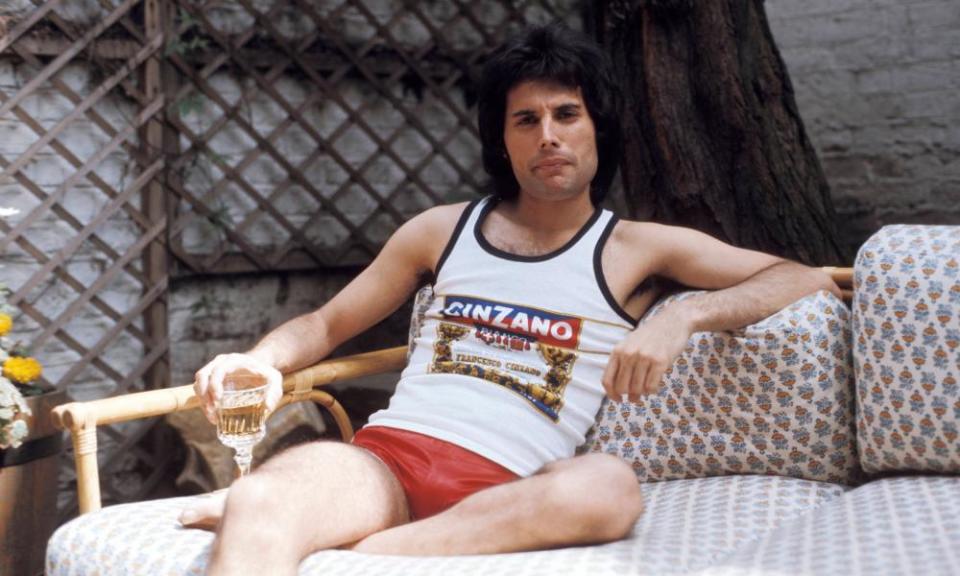
Do you agree that Sheer Heart Attack is Queen’s greatest album? If not, which do you consider the best? Gerimus
It was a breakthrough in terms of getting out there, but I don’t know if it’s the greatest. My favourite, strangely enough, is probably the last one, Made in Heaven, which we completed after Freddie had gone. It’s got so much depth to it, so much spiritual content and emotion, because we were working with Freddie’s voice when Freddie was no longer here. It actually took us a couple of years to get to the point where we could do it because we were grieving. Roger and I went out and did our own tours and pretended Queen hadn’t existed. Then suddenly we looked at all of this embryonic material and thought, this album is crying out to be made. It was a labour of love, but I find that I can listen to it with a great feeling of peace now.
Are there any current bands whose releases are always essential listening for you? Stuckinazoo
I’m ashamed to say how little I sit down and listen to music. I’m generally making music, or working in some other way – in astrophysics, or campaigning for wild animals – and I have three children and seven grandchildren. There ain’t much time spare! I do have a few CDs in the car that I tend to keep listening to. Pink is one of them. I love her. She’s incredible. I listen to the Foo Fighters a lot and I like Avril Lavigne – I don’t get fed up with that, I always find her music fresh. There’s an ebullience to it that I like.
Can you remember the moment when you decided to ditch your promising career as an astrophysicist and go all in with being a musician? SmilinPeter
In a way, the decision was made for me. I did three years’ work on my PhD, then ran out of money, so I taught at a comprehensive school to support myself. At the end of that year, I tried to submit it but my supervisor didn’t think it was good enough. I thought: “Oh, God, I really can’t do this”. Queen were rehearsing in the evenings, as I was teaching, writing my thesis and not sleeping. Something had to go. I thought, I’m obviously not good enough as a scientist, so I should give it up. And Queen was just at that point where you could see the door opening. We had the beginnings of the idea of how to be on stage, how to create an act. We thought, let’s go for this. I never regretted it but I was very fortunate that I was able to go full circle and come back to the PhD 30 years later.
How do you go back to academic research and write a thesis in astronomy after having known great success in the field of music? Where do you find the motivation, the energy? nympheableu
I kept thinking: “What if?” I always stayed quite close to astronomy. One of my greatest friends was the astronomer Patrick Moore. He presented The Sky at Night for 50 years, with only one break, when he got poisoned by an egg. He was like a beneficent uncle to me. We started writing a book together, The History of Universe – a rather ambitious project – and he encouraged me to go back and write my PhD. I started mentioning it in interviews, and Prof Michael Rowan-Robinson read it. He was the head of astrophysics at Imperial College, where I had started 30 years before. Suddenly, I found myself on the phone to him. He said: “If you’re serious about finishing your PhD, I will be your supervisor.” I had to say yes. It was an incredible opportunity, but it was incredibly tough. More than once, I badly wanted to give up. For a year, I basically dropped everything – I didn’t make any music, and hardly ever saw my family. Everyone was going to say: “He got special treatment because he’s a rock star”, so they had to be seen to be making it really tough for me. But in the end I got my doctorate.
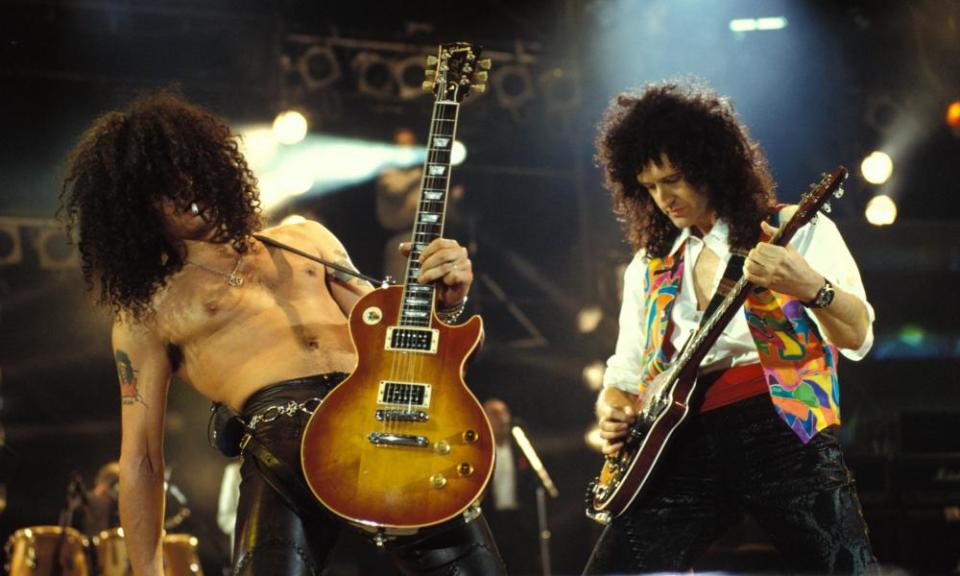
In 1993 you went on tour with Guns N’ Roses during their infamous Use Your Illusion world tour with the Brian May Band. What was your experience like? Aglassofsherryniles
It was a great time and highly dangerous. You never knew what was going to happen, if Guns were going to get on the stage or notor if Axl [Rose] would suddenly decide that he couldn’t do it that particular day. Once they did hit the stage, it was like an earthquake. They were amazing, a great live band – and they were very kind to me. Axl was a fan of Queen and very influenced by what we did. There was no Freddie any more and I was singing and playing my own guitar at the same time – which is tough. It was a strange feeling, because they were playing these huge shows that Queen would have been playing. I remember a huge stadium in Turkey, where I thought, “wouldn’t it be great if Queen was here” – but of course we never will be. I was at peace with it, but then a few years later, there we were out playing huge, wonderful, packed venues again.
The badger cull is the greatest crime this country has ever committed against wildlife
Do you think that Michael Eavis [Glastonbury’s founder] and yourself could ever sit down and sort out your differences [over their views on the badger cull]? It would be wonderful to see the band play Glastonbury just once. Timsporan
You can never say never, but it’s a very big matter of principle to me. I am convinced, more than ever, that the badger cull is the greatest crime this country has ever committed against wildlife. It’s completely pointless and the tragedy is immense: you’re talking about nearly half a million native animals killed and it’s not benefited farmers one bit. The fact that Michael Eavis supports badger-culling is difficult for me to swallow. I don’t really want to endorse his festival, but it’s not impossible that we could sit down and talk. I’ll talk to anyone – that’s the way we go forward.
You’ve worked with dozens of different musicians outside Queen. Who were the best on their given instrument? PlayUpBarnstoneworth
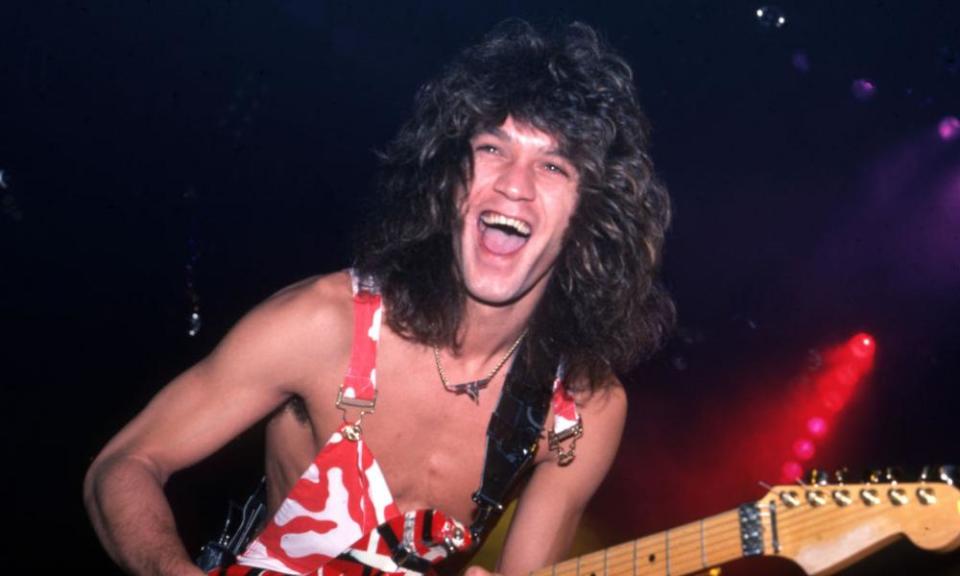
Eddie Van Halen – bringing us back to Star Fleet. He’s incredible. Like Jimi Hendrix, he took the guitar to a new place, he gave it an extra dimension and millions of people have followed him. He was a wonderful guy to be around, too: very innocent, very full of fun and light. He never seemed to try, nothing was ever difficult for him – he just had those magic fingers. We’d never worked together before Star Fleet, only hung out – it was really glorious to be around him and have those moments.
Lots of folks have had a go at covering Queen songs over the years. Do you have a favourite? StarFlapper
Garth Brooks did Crazy Little Thing. He’s another one of those people who just doesn’t have to try, it just comes out great. His heart and soul is in it.
Which moments in your career are you most proud of? Romead
Standing on the roof of Buckingham Palace, live, without a safety net, in front of one billion people [watching on TV]. Nothing could ever quite top that, really, for sheer management of terror. It’s hard to function, you have so much fear – and it was the whole opening of the golden jubilee, so everything depended on it. If it had gone wrong, I would have forever been the guy who messed it up. I had to give myself a very good talking-to. My strategy was this thing they teach you in depression clinics, which is to abandon yourself to a higher power, whether it’s God or whatever – you just concentrate on the things that you can actually control. So, I practised, I did some rehearsals with the orchestra. But I had to do it live – you couldn’t fake something like that – if I had, I would have forever been the guy who faked it. It was all real, and all live, and I will never ever forget it. The adrenaline was incredible.
• Star Fleet Sessions is released via Duck Productions on 14 July


